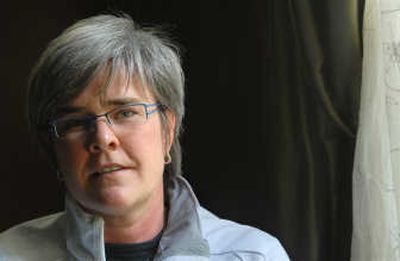‘Don’t ask’ challenge reinstated

OLYMPIA – The military cannot automatically discharge people because they’re gay, a federal appeals court ruled Wednesday in a case involving an Air Force nurse from Spokane.
A three-judge panel of the 9th U.S. Circuit Court of Appeals reinstated Maj. Margaret Witt’s constitutional challenge to the military’s “don’t ask, don’t tell” ban on sexually active gay men and lesbians. A lower court had thrown out the case.
Wednesday’s ruling doesn’t get Witt back into the Air Force. It called for more fact-finding so a court can weigh her rights against the Air Force’s rationale for the ban.
But in what could prove to be a critical turning point, the judges also indicated that the long-standing military policy merits stricter scrutiny because of a landmark 2003 U.S. Supreme Court ruling.
No other court, according to the Air Force, has ever said that.
An attorney for Witt, James Lobsenz, hailed the ruling as the beginning of the end for “don’t ask, don’t tell.”
“If the various branches of the Armed Forces have to start proving each application of the policy makes sense, then it’s not going to be only Maj. Witt who’s going to win,” Lobsenz said. “Eventually, they’re going to say, ‘This is dumb … it’s time to scrap the policy.’ “
Witt said Wednesday she was thrilled. While the military maintains that sexually active gays and lesbians threaten morale, Witt says she was a key part of a tight-knit unit.
If anything hurt morale, she says, it was the Air Force’s removal of an experienced, decorated flight nurse during a war. Years after being forced to leave, she’s still in touch with members of her unit and has been invited to its 50th anniversary celebration.
“I still miss my Air Force family and would love the opportunity to fulfill my duties and be there to help anybody that needs it,” she said.
A spokesman at Witt’s former Air Force unit didn’t return a call seeking comment on the case.
Witt joined the Air Force in 1987, becoming a reservist in 1995. She lived in Spokane; her unit worked out of McChord Air Force Base near Tacoma.
She was promoted to major, served in the Persian Gulf, and was awarded several service medals. For more than a decade, her photo was featured in Air Force recruiting brochures.
In Spokane, Witt was in a committed relationship with a civilian woman from July 1997 through August 2003. The two shared a home.
About a year after the couple broke up, the Air Force launched an investigation into allegations that Witt was a lesbian.
“Under the facts alleged in the complaint, the statute’s popular name appears to be a misnomer as applied to Major Witt,” 9th Circuit Judge William Canby wrote. “She did not tell, but the Air Force asked.”
In November 2004, Witt’s reservist work, pay, promotion points and retirement benefits were halted. After years in limbo and an unsuccessful appeal, Witt was honorably discharged in October 2007 – a fact she learned only when told that her Air Force dental insurance was no longer valid.
With help from the American Civil Liberties Union, Witt in 2006 had sought a federal injunction to force the Air Force to let her stay. Judge Ronald Leighton said he was sympathetic, but he dismissed her case. She appealed to the 9th Circuit.
The San Francisco-based court has repeatedly turned down challenges to the military’s “don’t ask, don’t tell policy” and its predecessors. But on Wednesday, the judges said that a 2003 U.S. Supreme Court case, Lawrence v. Texas, has changed the legal landscape.
In that case, the nation’s highest court struck down a Texas sodomy law.
“When sexuality finds overt expression in intimate conduct with another person, the conduct can be but one element in a personal bond that is more enduring,” the Supreme Court opinion said. “The liberty protected by the Constitution allows homosexual persons the right to make this choice.”
Witt’s lawyers argue that the ‘03 ruling suggests a fundamental right to private, consensual same-sex intimacy, against which the military’s ban must face tougher scrutiny. The military – and Congress, which passed “don’t ask, don’t tell” – maintains that sexually active gays and lesbians “create an unacceptable risk to the high standards of morale, good order and discipline, and unit cohesion that are the essence of military capability.”
The 9th Circuit judges said the court doesn’t have enough information to weigh any harm to Witt against that military rationale. So they remanded Witt’s case back to Judge Leighton.
In Spokane, Witt continues to work as a physical therapist for Spokane Public Schools and to take nursing certification courses. She’s applying for a job with the Veterans Administration.
“It’s extremely humbling and very surreal,” she said of the publicity her struggle has attracted. “I know that we’re far from being done, but as long as I can hang in there and put it one step closer, I think that’s a great thing.”